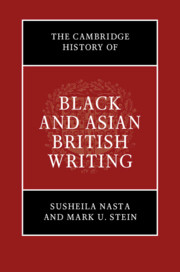Book contents
- The Cambridge History of Black and Asian British Writing
- The Cambridge History of Black and Asian British Writing
- Copyright page
- Dedication
- Contents
- Notes on Contributors
- Preface and Acknowledgements
- Introduction
- Part I New Formations
- Part II Uneven Histories
- (I) Global Locals
- (II) Disappointed Citizens
- 12 Looking Back, Looking Forward
- 13 Double Displacements, Diasporic Attachments
- 14 Wide-Angled Modernities and Alternative Metropolitan Imaginaries
- 15 Forging Collective Identities
- 16 Breaking New Ground
- 17 The Lure of Postwar London
- 18 Looking Beyond, Shifting the Gaze
- (III) Here to Stay
- Part III Writing the Contemporary
- Select Bibliography
- Index
17 - The Lure of Postwar London
Networks of People, Print, and Organisations
from (II) - Disappointed Citizens
Published online by Cambridge University Press: 19 December 2019
- The Cambridge History of Black and Asian British Writing
- The Cambridge History of Black and Asian British Writing
- Copyright page
- Dedication
- Contents
- Notes on Contributors
- Preface and Acknowledgements
- Introduction
- Part I New Formations
- Part II Uneven Histories
- (I) Global Locals
- (II) Disappointed Citizens
- 12 Looking Back, Looking Forward
- 13 Double Displacements, Diasporic Attachments
- 14 Wide-Angled Modernities and Alternative Metropolitan Imaginaries
- 15 Forging Collective Identities
- 16 Breaking New Ground
- 17 The Lure of Postwar London
- 18 Looking Beyond, Shifting the Gaze
- (III) Here to Stay
- Part III Writing the Contemporary
- Select Bibliography
- Index
Summary
Partly due to their British colonial education, many writers were lured to the postwar metropolis to find publishers and a wider audience for their work. This chapter discusses the contradictory stances of the publishing industry in the 1950s and 1960s. It traces the interactions between editors, audiences, and other cultural networks that made London an international publishing capital for ‘new’ Commonwealth authors (as they were then known). It was in London that Amos Tutuola or Wilson Harris were first noticed by Faber and Faber, and Sam Selvon’s A Brighter Sun (1952) or George Lamming’s In the Castle of My Skin (1953) first appeared. This interest soon waned, however, as issues of race, nation, and identity began to dominate, and sharp divisions were apparent, partially due to the myopia of some publishers and the parochial reception of some critics. The chapter also points forwards to the social and political contexts which provoked the vital growth of smaller and more radical publishing houses such as New Beacon (1966) in the 1970s and 1980s.
- Type
- Chapter
- Information
- The Cambridge History of Black and Asian British Writing , pp. 278 - 295Publisher: Cambridge University PressPrint publication year: 2020

